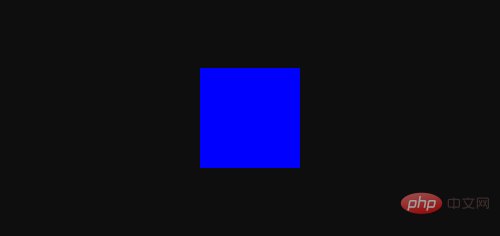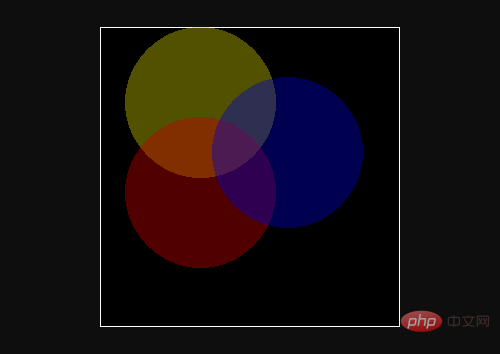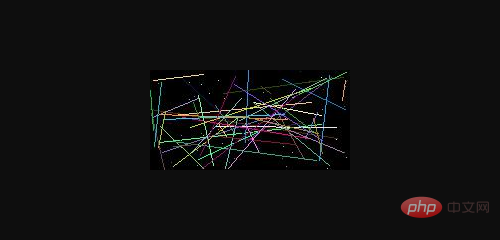 Backend Development
Backend Development
 PHP Tutorial
PHP Tutorial
 Detailed analysis of how to define colors, draw points, lines and rectangles in PHP?
Detailed analysis of how to define colors, draw points, lines and rectangles in PHP?
Detailed analysis of how to define colors, draw points, lines and rectangles in PHP?
In the previous article, I brought you "How to output pictures in PHP? (Detailed explanation of the legend) ", which introduces in detail how to output images in PHP. This article continues to show you how we should draw images in PHP. I hope it can help you!

Drawing images in PHP is all based on the canvas in the previous article, create the canvas, and then draw the image on the canvas. When we think of images, we think of colors, so first, let's take a look at how we should define colors for images in PHP.
Image definition color
When we use PHP to operate images, it is inevitable to set the color and outline different colors Came out with this beautiful image. So how should we provide color to images in PHP? At this time we will use the two functions imagecolorallocate() and imagecolorallocatealpha(). Next, let's take a look at how to use these two functions.
imagecolorallocate()Function
imagecolorallocate() function can be used for images Assign colors. If you want to set multiple colors, you need to call this function multiple times. The syntax format of the function is:
imagecolorallocate(resource $image, int $red, int $green, int $blue)
Among them, $image represents the image whose color needs to be set, and the function will return an identifier. Represents the color composed of the given RGB components. $red, $green and $blue are the red, green and blue components of the required color respectively. The value range is an integer from 0 to 255 or hexadecimal 0x00 to 0xFF.
The example is as follows:
<?php
$image = imagecreate(100, 100);
$blue = imagecolorallocate($image, 0, 0, 255);
header('Content-type:image/jpeg');
imagejpeg($image);
imagedestroy($image);
?>Output result:

## imagecolorallocatealpha()
Function
imagecolorallocatealpha(resource $image, int $red, int $green, int $blue, int $alpha)
<?php
$size=300;
$image=imagecreatetruecolor($size,$size);
$back=imagecolorallocate($image,0,0,0);
$border=imagecolorallocate($image,255,255,255);
imagefilledrectangle($image,0,0,$size-1,$size-1,$back);
imagerectangle($image,0,0,$size-1,$size-1,$border);
$yellow_x=100;
$yellow_y=75;
$red_x=100;
$red_y=165;
$blue_x=187;
$blue_y=125;
$radius=150;
//用alpha值分配一些颜色
$yellow=imagecolorallocatealpha($image,200,200,0,75);
$red=imagecolorallocatealpha($image,200,0,0,75);
$blue=imagecolorallocatealpha($image,0,0,200,75);
//画3个交迭的圆
imagefilledellipse($image,$yellow_x,$yellow_y,$radius,$radius,$yellow);
imagefilledellipse($image,$red_x,$red_y,$radius,$radius,$red);
imagefilledellipse($image,$blue_x,$blue_y,$radius,$radius,$blue);
//不要忘记输出正确的header!
header('Content-type:image/png');
//最后输出结果
imagepng($image);
imagedestroy($image);
?> ##From this, through imagecolorallocate() and imagecolorallocatealpha() These two functions can already define colors on images. At the same time, images are not only made up of colors, but also dots, lines and different shapes. Then let's take a look at how to solve these problems.
##From this, through imagecolorallocate() and imagecolorallocatealpha() These two functions can already define colors on images. At the same time, images are not only made up of colors, but also dots, lines and different shapes. Then let's take a look at how to solve these problems.
Drawing points and lines
Drawing points and lines can be said to be the most basic operation of drawing images in PHP, although it is very simple. Basic, but with flexible application, more complex images can be drawn through them. We can draw a point in the canvas through the
function, and can also set the color of the point. The syntax of its function The format is as follows: <div class="code" style="position:relative; padding:0px; margin:0px;"><pre class='brush:php;toolbar:false;'>imagesetpixel(resource $image, int $x, int $y, int $color)</pre><div class="contentsignin">Copy after login</div></div> Among them, $image represents the created canvas, $x and $y represent the coordinate point at ($x, $y), and the color of this coordinate point is $color.
To draw a line segment, you can use the
function. Its syntax format is as follows: <div class="code" style="position:relative; padding:0px; margin:0px;"><pre class='brush:php;toolbar:false;'>imageline(resource $image, int $x1, int $y1, int $x2, int $y2, int $color)</pre><div class="contentsignin">Copy after login</div></div> Among them, it represents the coordinate ($x1,$y1) A line segment with color $color to coordinates ($x2,$y2).
Next we can give an example by combining loops and random numbers:
<?php
$img = imagecreate(200, 100);
imagecolorallocate($img, 0, 0, 0);
$blue = imagecolorallocate($img, 0, 0, 255);
$red = imagecolorallocate($img, 255, 0, 0);
for ($i=0; $i <= 50; $i++) {
$color = imagecolorallocate($img, rand(0, 255), rand(0, 255), rand(0, 255));
imagesetpixel($img, rand(0, 200), rand(0, 100), $color);
imageline($img, rand(0, 200), rand(0, 100), rand(0, 200), rand(0, 100), $color);
}
header('Content-type:image/jpeg');
imagejpeg($img);
imagedestroy($img);
?>Output result:

Draw a rectangle
In PHP, if we want to draw a rectangle, we need to pass
Or imagefilledrectangle() function to perform. The imagefilledrectangle() function fills the rectangle after it is drawn, but the imagerectangle() function does not. Their syntax format is as follows:
imagerectangle(resource $image, int $x1, int $y1, int $x2, int $y2, int $color) imagefilledrectangle(resource $image, int $x1, int $y1, int $x2, int $y2, int $color)
Among them, both represent drawing a coordinate of the upper left corner ($x1, $y1) and the coordinates of the lower right corner ($x2, $y2). Rectangle, the difference between the two is: the color after the imagerectangle() function represents the color of the rectangle's edges, and the color after the imagefilledrectangle() function represents the fill color within the rectangle.
Next, draw a rectangle through the imagerectangle() or imagefilledrectangle() function through an example. The example is as follows:
<?php
$img = imagecreate(300, 150);
imagecolorallocate($img, 255, 255, 255);
$green = imagecolorallocate($img, 0, 255, 0);
$blue = imagecolorallocate($img, 0, 0, 255);
imagerectangle($img, 5, 5, 145, 145, $green);
imagefilledrectangle($img, 150, 5, 295, 145, $blue);
header('Content-type:image/jpeg');
imagejpeg($img);
imagedestroy($img);
?>Output result:
Recommended learning: "PHP Video Tutorial"
The above is the detailed content of Detailed analysis of how to define colors, draw points, lines and rectangles in PHP?. For more information, please follow other related articles on the PHP Chinese website!

Hot AI Tools

Undresser.AI Undress
AI-powered app for creating realistic nude photos

AI Clothes Remover
Online AI tool for removing clothes from photos.

Undress AI Tool
Undress images for free

Clothoff.io
AI clothes remover

Video Face Swap
Swap faces in any video effortlessly with our completely free AI face swap tool!

Hot Article

Hot Tools

Notepad++7.3.1
Easy-to-use and free code editor

SublimeText3 Chinese version
Chinese version, very easy to use

Zend Studio 13.0.1
Powerful PHP integrated development environment

Dreamweaver CS6
Visual web development tools

SublimeText3 Mac version
God-level code editing software (SublimeText3)

Hot Topics
 1393
1393
 52
52
 1205
1205
 24
24
 PHP 8.4 Installation and Upgrade guide for Ubuntu and Debian
Dec 24, 2024 pm 04:42 PM
PHP 8.4 Installation and Upgrade guide for Ubuntu and Debian
Dec 24, 2024 pm 04:42 PM
PHP 8.4 brings several new features, security improvements, and performance improvements with healthy amounts of feature deprecations and removals. This guide explains how to install PHP 8.4 or upgrade to PHP 8.4 on Ubuntu, Debian, or their derivati
 7 PHP Functions I Regret I Didn't Know Before
Nov 13, 2024 am 09:42 AM
7 PHP Functions I Regret I Didn't Know Before
Nov 13, 2024 am 09:42 AM
If you are an experienced PHP developer, you might have the feeling that you’ve been there and done that already.You have developed a significant number of applications, debugged millions of lines of code, and tweaked a bunch of scripts to achieve op
 How To Set Up Visual Studio Code (VS Code) for PHP Development
Dec 20, 2024 am 11:31 AM
How To Set Up Visual Studio Code (VS Code) for PHP Development
Dec 20, 2024 am 11:31 AM
Visual Studio Code, also known as VS Code, is a free source code editor — or integrated development environment (IDE) — available for all major operating systems. With a large collection of extensions for many programming languages, VS Code can be c
 Explain JSON Web Tokens (JWT) and their use case in PHP APIs.
Apr 05, 2025 am 12:04 AM
Explain JSON Web Tokens (JWT) and their use case in PHP APIs.
Apr 05, 2025 am 12:04 AM
JWT is an open standard based on JSON, used to securely transmit information between parties, mainly for identity authentication and information exchange. 1. JWT consists of three parts: Header, Payload and Signature. 2. The working principle of JWT includes three steps: generating JWT, verifying JWT and parsing Payload. 3. When using JWT for authentication in PHP, JWT can be generated and verified, and user role and permission information can be included in advanced usage. 4. Common errors include signature verification failure, token expiration, and payload oversized. Debugging skills include using debugging tools and logging. 5. Performance optimization and best practices include using appropriate signature algorithms, setting validity periods reasonably,
 How do you parse and process HTML/XML in PHP?
Feb 07, 2025 am 11:57 AM
How do you parse and process HTML/XML in PHP?
Feb 07, 2025 am 11:57 AM
This tutorial demonstrates how to efficiently process XML documents using PHP. XML (eXtensible Markup Language) is a versatile text-based markup language designed for both human readability and machine parsing. It's commonly used for data storage an
 PHP Program to Count Vowels in a String
Feb 07, 2025 pm 12:12 PM
PHP Program to Count Vowels in a String
Feb 07, 2025 pm 12:12 PM
A string is a sequence of characters, including letters, numbers, and symbols. This tutorial will learn how to calculate the number of vowels in a given string in PHP using different methods. The vowels in English are a, e, i, o, u, and they can be uppercase or lowercase. What is a vowel? Vowels are alphabetic characters that represent a specific pronunciation. There are five vowels in English, including uppercase and lowercase: a, e, i, o, u Example 1 Input: String = "Tutorialspoint" Output: 6 explain The vowels in the string "Tutorialspoint" are u, o, i, a, o, i. There are 6 yuan in total
 Explain late static binding in PHP (static::).
Apr 03, 2025 am 12:04 AM
Explain late static binding in PHP (static::).
Apr 03, 2025 am 12:04 AM
Static binding (static::) implements late static binding (LSB) in PHP, allowing calling classes to be referenced in static contexts rather than defining classes. 1) The parsing process is performed at runtime, 2) Look up the call class in the inheritance relationship, 3) It may bring performance overhead.
 What are PHP magic methods (__construct, __destruct, __call, __get, __set, etc.) and provide use cases?
Apr 03, 2025 am 12:03 AM
What are PHP magic methods (__construct, __destruct, __call, __get, __set, etc.) and provide use cases?
Apr 03, 2025 am 12:03 AM
What are the magic methods of PHP? PHP's magic methods include: 1.\_\_construct, used to initialize objects; 2.\_\_destruct, used to clean up resources; 3.\_\_call, handle non-existent method calls; 4.\_\_get, implement dynamic attribute access; 5.\_\_set, implement dynamic attribute settings. These methods are automatically called in certain situations, improving code flexibility and efficiency.



